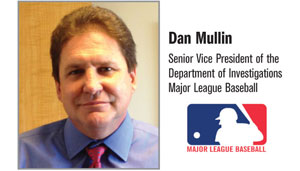2012 Security 500 Leader Profiles
 Dan Mullin, Senior Vice President of the Department of Investigations, Major League Baseball
Dan Mullin, Senior Vice President of the Department of Investigations, Major League Baseball
For the Love of the Game
One of the uniquechallenges that Dan Mullin is presented with every day at Major League Baseball is to maximize public safety while maintaining a great fan experience.
“The most important thing is that our security be rigorous but invisible. Law enforcement is visible but security should be invisible,” says Mullin, who previously spent 23 years with the NYPD. “Baseball is entertainment and our role is to ensure that the fan experience is safe and secure without having to interact with us unless it is necessary.”
As Senior Vice President of the Department of Investigations, Mullin works with each of the 30 MLB teams, venues and their personnel to identify and mitigate risks that range from fan and player safety to preserving the integrity of the game. In addition to having on-site assets, MLB employs 11 full-time employees in Security and 19 in Investigations within the Office of the Commissioner. Security and Investigations both report to Executive Vice President John McHale Jr. It has a larger organization than most other sports leagues.
“The Mitchell Report recommended that baseball create a breakaway department for managing performance enhancing drugs and ethical issues. That changed our structure into two groups,” explains Mullin. “Security and Investigations are split.”
“With 162 games, plus the playoffs and other high-profile events like the All-Star Game, we require a significant staff to adhere to best practices and ensure strong risk management and security every day,” explains Mullin. The unique nature of Major League Baseball’s events requires risk assessments for their high-profile events. “The World Series is one example, but we also do assessments on the Yankee-Red Sox games. The number one risk assessed game is the All-Star Game,” says Mullin.
Unlike the World Series, the All-Star Game has a known location announced well in advance of the event and brings together the best and biggest stars in the league, hence its name, plus a VIP list. More than just the game, it is actually an All-Star Week. “There is a parade, concert and Hall of Fame event. As a result, we have a significant assessment and mitigation process,” Mullin says.
“Commissioner Selig is the most supportive boss for personnel, travel, training, technology and all resources we require to get the job done successfully,” Mullin says. The interaction and coordination with the teams and their stadiums are critical for success. Each team has its own apparatus and security operations. “The people at the team level are very capable and we rely on them because there are different environments and cultures. There are also different relationships with law enforcement and emergency management resources that require communication and flexibility. For example, the large, open area around the ballpark in Arlington, Texas offers a very different environment than Wrigley Field in Chicago. Therefore, we plan differently,” says Mullin.
Nothing is more interesting or exciting than being a part of the baseball’s international expansion. “International games are fun to do and I enjoy being a part of the team that is growing the business around the world. Obviously, it is very different culture and environment than any in the U.S. And the complexity grows when working with the venues and law enforcement teams in other countries,” explains Mullin.
In preparation for the 2004 season opening game between the New York Yankees and Tampa Bay, Mullin traveled to Tokyo six times for the event.
“As an example, local law enforcement in Tokyo is not as sensitive to terror threats as we are, because they have not had a 9/11 event. Another issue is emergency medical treatment and staffing. In Japan, ambulances are purely used for transportation, while in the U.S. an EMT will be treating the patient during that trip to the hospital. So we really needed to understand the local people and resources and support them to meet our requirements and mitigate risks.”
Day in and day out, Mullin’s role requires him to be involved different aspects of the game. “The league has a best practices program and each team has a fan code of conduct. Through education, training and preparation, we focus on continuous improvement,” notes Mullin. A key part of their feedback loop includes metrics. Mullin points to the new construction of ballparks as a benefit. “Most of the ballparks are new and they were designed with security in mind. We have incident command structures, cameras and emergency systems installed in the event they are needed. This makes the assessment and response planning easier.”
“CEOs and Commissioners should know that very little happens in any organization without security being involved,” he says. “And the more it is involved in identifying and mitigating risks, the more cost-effective and invisible it will remain.”
Mullin’s favorite aspect of his job is that he has an opportunity to work with talented people and teach security best practices to others that work in baseball. In addition to his duties at MLB, Mullin teaches at Syracuse University College of Law.
Security Scorecard
• Revenue/Budget: $7,200,000,000
• Security Budget: $7,134,000
• Critical Issues:
– Fan Safety/Crowd Control/Fan Code of Conduct
– Workforce/VIP Protection and Safety
– International Expansion
Security Mission
• Asset Protection/Loss Prevention
• Business Continuity
• Drug and Alcohol Testing
• Emergency Management/Crisis Management
• Investigations
• Physical Security/Facilities
• Regulatory Compliance
• Risk Management
• Supply Chain/Vendor
• Workforce/Executive/Personnel Protection
Looking for a reprint of this article?
From high-res PDFs to custom plaques, order your copy today!



